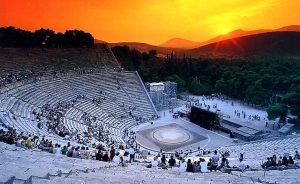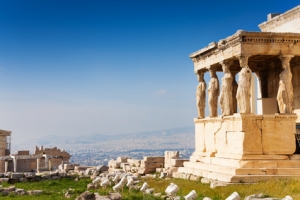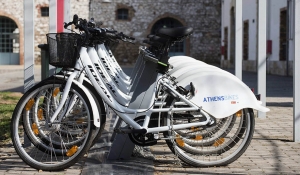ABOUT US
XpatAthens
Thursday, 04 February 2021 07:00
The Greek Foustanella: From Military To Nation Symbol
Worn by the emblematic Greek Evzones, the foustanella has come to be understood as a symbol of valiance, bravery and resistance.
The history of the skirt-like garment has been written by the klephts (the brigands of the mountains), and the armatoloi (irregular soldiers commissioned by the Ottomans to enforce the Sultan’s authority), who later formed the nucleus of the Greek fighting forces during the War of Independence against the Turks. The garment was worn by the Greek soldiers of the 1st Regiment Greek Light Infantry in British service (1810-1812), by the soldiers (mostly from Mani or Roumeli) of the Light Infantry (1837-1838), by the Greek legion in the 1853-1856 Crimean War, by the Mylonas rifle-carrying Evzones (1874-1877), and by the Royal Guard detachment, who, as elements of the regular infantry divisions, fought in the First World War as well as the Asia Minor Campaign and the Greco-Italian War.
From the Greek War of Independence to the war against the Italians and right up to the present, the Evzone uniform has always been a point of reference. It has adapted to geography and weather conditions. “The full-pleated all-white foustanella meets ancient Greek heritage,” Haitoglou says.
As folk dancers and some schoolchildren prepare their foustanellas, scarlet fez caps, and leather tsarouchia shoes ahead of the March 25 Independence Day parades, the elite ceremonial Evzones unit is the subject of a special tribute in Athens. A total of 40 colored drawings of the Evzone uniform by painter and costume designer Yiannis Mylonas illustrate the historical evolution of what could be described as the quintessential Greek national dress from 1821 to this day, the different variations, and the conditions under which these were designed.
Prepared in cooperation with Thessaloniki’s Museum of the Macedonian Struggle, the exhibition is curated by Vassilis Nikoltsios and Stavroula Mavrogeni. The works belong to the private collection of Alexandros and Lena Haitoglou.
To read this article in full, please visit: eKathimerini.com
To read this article in full, please visit: eKathimerini.com
Published in
Greek Language & Culture
Tagged under
Thursday, 31 March 2016 07:00
Scrap Car Subsidies Extended Until May 20
The government has decided to extend its vehicle-scrapping initiative until May 20, in which it subsidizes the purchase of new cars so that old vehicles are taken off the road; although the subsidy will be cut by 50 percent from last year.
The measure will be brought to parliament and once signed by Finance Minister Euclid Tsakalotos, it will apply retroactively from January 1. This will bring great relief to the thousands of prospective buyers who have the necessary scrapping documents, but were unable to proceed with their new purchase.
To read more, please visit: eKathimerini
Published in
Local News
Tagged under
Monday, 02 May 2016 07:00
May 1 Holiday Has Been Moved To May 3
The national May Day Holiday (or Protomagia in Greek) celebrated on May 1st 2016 will be moved to Tuesday May 3rd 2016 due to it coinciding with Greek Orthodox Easter Sunday.
This was a decision authorized and signed by Labour Minister George Katrougalos.
What the law says about working on this day:*
Business operation and employing employees is prohibited, except those who are legal to operate on Sundays and public holidays, such as companies in the health sector, tourism, transportation, food & beverage, factories with continuous hours, etc.
Employees who are paid by a wage, but who will not work on the May Day public holiday are entitled to receive their paid wages without any deduction. For employees paid by wage who will work on May 1, they are entitled to receive their wage with an increase of 75% which will be calculated at the statutory hourly rate for any hours worked.
If you are paid a monthly salary, and the company typically does operate on Sundays and public holidays then you are entitled to receive an increase of 75% calculated at the statutory hourly rate for any hours worked on this day. If you are employed with a company that typically does not work on Sundays and public holidays then you are entitled to receive an increase of 75% calculated at the statutory hourly rate for any hours worked on this day.
Source: Paidorama
* Please note, the information outlined is based on a report that has been translated from Greek and should be confirmed with your employer and local employment offices.
Published in
Local News
Tagged under
Monday, 15 January 2024 07:00
Top Work-Friendly Cafes For Digital Nomads In Athens
Whether you're a freelancer or a student or you just like a great space with a Wi-Fi connection, knowing the best work cafe is crucial in this digital age. Here are a few great spots in the greater Athens area that will caffeinate you, feed you, and inspire you to get the job done!
The Underdog
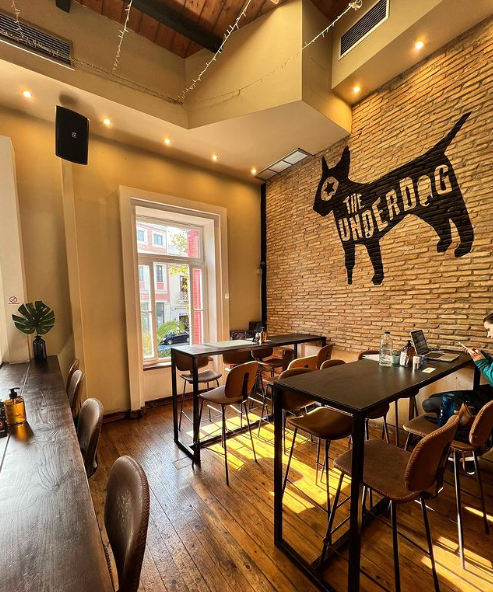
Credit: @the_underdog_project

Credit: @the_underdog_project
All the natural light pouring in from its floor-to-ceiling windows will help get you up and running, but The Underdog’s main attraction is coffee. As one of the first micro-roasteries in Athens serving single-origin beans freshly roasted, one cup will get you wired enough to meet any looming deadline.
Address: Irakleidon 8, Thiseio
Telephone: 213 0365393
Telephone: 213 0365393
Kain

Credit: @shoppingtherapy

Credit: @shoppingtherapy
As one of the only all-day bars in Mets, Kain (aka Cain) is a bright, art-deco-ified spot with a laid-back attitude ideal for cranking out a task. Score the large table by the window and try to resist the temptation to lose yourself in the flamingo and floral mural. Still there after 5 p.m.? Try the Killer’s Hand, a cocktail that may just give you the right motivation to keep going.
Address: 22 Anapafseos & 1 Timoleontos, Mets
Telephone: 210 9227616\
Saorsa
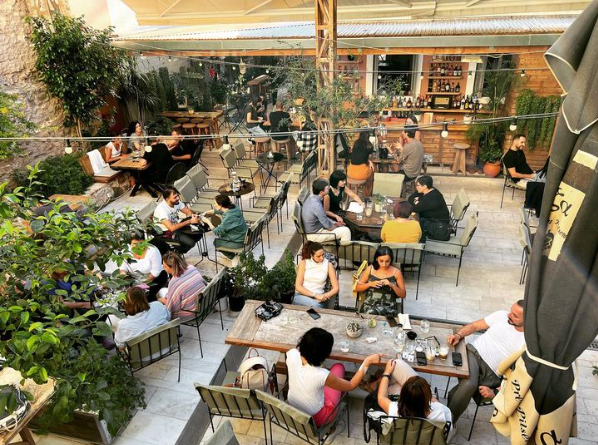
Credit:@saorsa
Meaning "freedom" in Scottish Gaelic, Saorsa in Metaxourgeio is a lively cafe-cocktail bar where you can do many things, including work! Find your sport in its inner courtyard, one of the most picturesque spots in Athens, and enjoy fantastic drinks and delectable food under the Attic sky.

Credit:@saorsa
Meaning "freedom" in Scottish Gaelic, Saorsa in Metaxourgeio is a lively cafe-cocktail bar where you can do many things, including work! Find your sport in its inner courtyard, one of the most picturesque spots in Athens, and enjoy fantastic drinks and delectable food under the Attic sky.
Address: Giatrakou 2, Athina
Telephone: 210 5235960
Kinonó

Credit: @kinonobar

Credit: @kinonobar
With its dramatic high ceiling, light and airy atmosphere, and above all its artistic, and literary clientele, it's easy to mistake Kinonó for an art gallery. However, a lot gets done during the day amid these stylish surroundings while inventive snacks, eclectic DJ sets, and great cocktails entice you to stay after dark!
Address: Falirou 48, Athina
Telephone: 21 1408 6826
Naif
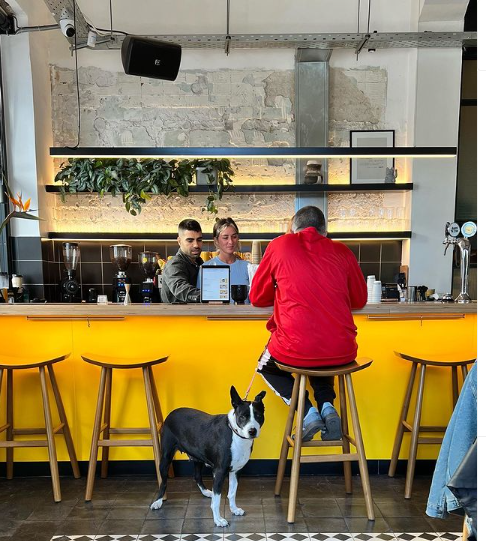
Credit: @mariakrith
Naif

Credit: @mariakrith
Tucked behind the Onassis Stegi culture hub, Naif is a vibrant neighborhood spot in Neos Kosmos. Serving delightful coffee, tasty food, and assorted drinks, it's a local gem with a cosmopolitan touch. On the 1st floor above Naif, you will discover Naif Club—a fresh space for work, meetings, and events. If the café gets too lively, you can escape to the designated quiet area upstairs.
Address: Leontiou 10, Athina
Telephone: 210 9334946
Published in
Pubs, Bars & Cafes
Tagged under
Friday, 13 October 2017 16:42
Urban Gastronomy In Athens
Here is one of our favourites from Jack where he takes us to two of Athens' coolest and most delicious restaurants!
I love tavernas as much as the next guy, but I also love to be surprised by unexpected flavours and interesting spaces, by those little restaurants around little corners of the city that catch your eye as you walk past. Or that you hear about on Facebook ;). In the past couple weeks, I’ve splurged and tried two of the newer food spots around town.
I love tavernas as much as the next guy, but I also love to be surprised by unexpected flavours and interesting spaces, by those little restaurants around little corners of the city that catch your eye as you walk past. Or that you hear about on Facebook ;). In the past couple weeks, I’ve splurged and tried two of the newer food spots around town.
Nolan is one of those rare places that, after just one bite, makes you stop and look across at your dinner companion with a look of wonder on your face: ‘Do you taste what I'm tasting? Is it possible that this is real? Is it just me or is this amazing...?’
Let me be very clear: Nolan gets my strong recommendation for some of the most interesting food I've had in Athens. The menu, by Greek-Japanese chef Sotiris Kontizas, is small and meant to be shared. The food is carefully prepared and presented. The flavours range from Vietnamese to Thai to Greek - and everything in between. Sophisticated and delicious.
The space is small, with around 10 tables in total, so book ahead if possible. On the night I went, they wouldn’t take a reservation prior to 10:00pm - not sure if this is a policy. The space itself has an airy, modern, minimal design, with lots of tall vertical lines. Really friendly service, better than average. Original wine list, easy to find something interesting to go with your interesting meal. And very cool lounge-y soundtrack playing in the background.
Dinner for 2 with wine and a full stomach ran to just shy of €60 - this is not your neighbourhood taverna. But if you have the urge to splurge on a really unique meal, Nolan will not disappoint.
On another night, I went by Feedel, another newish spot off Ermou, around a tiny corner from the Kapnikarea church. This is a small thoroughly urban spot, owned by the same group that runs Akanthus and Nalu along the Alimos beachfront, among others… Feedel is billed as ‘urban gastronomy’ – a tasty twist on modern Greek fare. This is a ‘hidden treasure’ in all senses of the word. High quality Greek ingredients, yummy small plates for sharing and an impressive wine list – with a sommelier on staff for those who want a special experience. The plates are quite small, so expect to order lots. This is a sophisticated taverna, with an urban edge. Relaxed, hip vibe, a cool & cozy space, great service, outdoor seating – reservations recommended! You can even grab a spot at the bar. After wine and lots of food, this also takes us into the same price range as Nolan.
The Athens food scene is more than tavernas and cafes – I challenge anyone to say otherwise. Happily, there seem to be more and more great spots popping up, with delicious, thoroughly modern food - sort of a ‘food renaissance’ born out of (and in spite of?) crisis… Bon apetit!
Until next week,
Jack
Nolan
Voulis 31, Syntagma
+30 210 324 3545
Feedel Urban Gastronomy
Ktena 1, Athens
+30 210 321 0551
Published in
My Week In Athens
Tagged under
Tuesday, 29 March 2016 07:00
Famous Greek Landmarks Not To Be Missed
Greece is a world renowned travel destination known especially for summer holidays and more recently for its incredible winter locales. As a country so full of extraordinary landscapes and impressive historical sites, there are hundreds of landmarks spread across the mainland and the islands. Here are some suggestions for landmarks in Greece that combine both history and natural beauty and that are excellent for visiting any time of the year!
Parthenon Temple (Acropolis)
Arguably the most important landmark in Greece is the celebrated Parthenon Temple of the Athens Acropolis, symbol of the ancient Greek civilization. Situated on top of a rocky hill, overlooking the city of Athens, the Parthenon is a temple built in the 5th century BC and originally dedicated to the goddess Athena. Made of Pentelic marble, this is a unique example of ancient Greek architecture.
The Caldera Of Santorini
A natural wonder, the caldera of Santorini is one of the most famous Greek landmarks. The caldera is actually part of a submerged volcano, created by an explosion about 3500 years ago. The impressive red cliffs of the caldera are better admired from the white villages constructed along the cliffs, such as Fira, Oia & Imerovigli.
Sanctuary Of Delphi
The ancient sanctuary of Delphi is one of the most famous ancient Greek landmarks. Set in marvelous green surroundings, Delphi was a religious and cultural centre of the ancient Greek world, with prominent constructions, such as the temple of Apollo, used as an oracle, the ancient theatre and the sanctuary of Athena Pronea. It is suggested to visit the site in spring, when nature is in full bloom.
Ancient Olympia
Ancient Olympia, one of the most important archaeological sites in Greece, was built around the 6th century BC. This is actually the original site of the ancient Olympic Games, which started as athletic competitions in honour of the god Zeus. The ancient sanctuary of Olympia included many impressive buildings, including the Temple of Zeus, the Ancient Stadium, the Gymnasium and several others sites.
The Medieval Town Of Rhodes
Enter the magic of the Medieval world by taking a stroll around the cobbled streets of the Old Town of Rhodes Island. This Medieval town, constructed as a stronghold by the Order of Saint John of Jerusalem during the Venetian occupation, is an UNESCO World Heritage site and a highly romantic destination.
The most important monuments, still excellently preserved, are the Palace of the Grand Master, the Old Hospital now turned into an Archaeological Museum and the Street of the Knights.
Epidaurus Ancient Theatre
The Ancient Theatre of Epidaurus is surely among the most famous Greek landmarks. Located next to the ancient sanctuary of god Asklepius, this theatre was actually where the religious festivities and theatre performances to honor the god would take place. Today the theatre still works and hosts drama performances during the summer, attracting thousands of visitors and tourists.
The Meteora Monasteries
A very important monastic community and a highly spiritual destination, the monasteries of Meteora are considered among the most famous Greek landmarks, attracting thousands of tourists and pilgrims every year. Built by monks on top of gigantic rock formations, these extraordinary monasteries date back to the 14th century and host many historical treasures. Six monasteries are still in use, situated above Kalambaka town in Thessaly.
To find out more great landmards, please visit: Greece Trip
Published in
Travel Greece
Tagged under
Sunday, 27 March 2016 10:38
How To Rent Your Flat On Airbnb
Those interested in renting out their properties, homes or flats in Greece on Airbnb must meet the following requirements as set out by the economy, finance and tourism ministries.
According to a recent government decision effective November 1, 2015, interested parties can lease properties that meet the standards of self-catering accommodation (furnished villas and rooms/apartments) subject to the provisions in article 46 of law 4179/2013 (A ‘175), without possessing the special accommodation sticker and with no set duration. Previously, in order to lease accommodation for less than 30 days, the special sticker was required.
Additionally, should owners of any of the above accommodation types provide services (cleaning, catering, protection) these will be taxed accordingly as income and be subject to the applicable laws as laid out by the finance ministry.
According to the current tax system, income from renting properties is taxed according to the following scale: for income less/equal than 12,000 euros, the tax rate is 11 percent, while for income over 12,000 euros, the rate is 33 percent. These rates may change once new tax legislation is voted in parliament.
According to the current tax system, income from renting properties is taxed according to the following scale: for income less/equal than 12,000 euros, the tax rate is 11 percent, while for income over 12,000 euros, the rate is 33 percent. These rates may change once new tax legislation is voted in parliament.
Owners wishing to engage in business activity and lease their property solely as a tourist accommodation [Article 1 of Law 4276/2014 (A 155)], must obtain legal authorization by local licensing and supervisory boards and obtain the special operations sticker. Different tax rules apply to properties registered as “tourist accommodation.”
Source: Greek Travel Pages
Source: Greek Travel Pages
Published in
Local News
Tagged under
Sunday, 27 March 2016 10:01
UNWTO Sees Bright Future For Greek Tourism
In 2015, international tourist arrivals to Greece grew by seven per cent and reached 23.6 million, while exports generated by the sector increased by six per cent to €14.2 billion.
United Nations World Tourism Organisation secretary general, Taleb Rifai, has expressed the confidence of the organisation in the continued growth of the tourism sector in Greece, saying: “We have no doubt that Greece will maintain a powerful image worldwide as a major tourism destination and that the country will consolidate its growth in 2016, as shown by booking trends.”
United Nations World Tourism Organisation secretary general, Taleb Rifai, has expressed the confidence of the organisation in the continued growth of the tourism sector in Greece, saying: “We have no doubt that Greece will maintain a powerful image worldwide as a major tourism destination and that the country will consolidate its growth in 2016, as shown by booking trends.”
This vow of support is timely for Greece as the country is advancing implementation of its new tourism policy framework, launched in 2015 to enhance international tourism. The diversification of the touristic offer benefits Greek hospitality, as does the development of new destinations and the opening of new high-end accommodation facilities and services.
Source: BreakingTravelNews
Published in
Greece In The News
Tagged under
Tuesday, 08 March 2022 07:00
Beautiful Routes For Bike Riding In Athens
With temperatures rising and the sun starting to shine, spring is in the air. It's the perfect time of year to enjoy a bike ride in Athens!
Here are our favorite bike routes in and around Athens that will get you exploring the city on two wheels.
Here are our favorite bike routes in and around Athens that will get you exploring the city on two wheels.
SEF Stadium - Glyfada
Distance: 13.5 km

📍 Peace and Friendship Stadium (SEF), Piraeus. @metalvein_gr
Along the coast on Poseidonos Avenue and the tram lines, next to the sea, the wide sidewalks are ideal for a bike ride under the shade of palm trees - a route especially perfect in the evening when the sea is magnificent. Park your car at Karaiskaki Stadium Parking or take the train to SEF Stadium (Ilektrikos - green line) and start your bike ride from this point.
Papagou - OAKA
Distance: 18 km

📍 Olympic Athletic Center of Athens (OAKA), Maroussi. @oaka.official
Distance: 18 km

📍 Olympic Athletic Center of Athens (OAKA), Maroussi. @oaka.official
Plenty of greenery and beautiful scenery along this comfortable route that starts from Papagou passes through Psychiko, Filothei, Kalogreza, and Maroussi. Along this route, there are a few hills and plenty of straightaways, which makes it an ideal route for amateur cyclists.
Neo Faliro - Pireus - Monastiraki
Distance: 7.55 km

📍 Piraiki, Piraeus. @danis_p_gr
Although it may sound scary to many, this is actually a very safe route. You'll travel along tree-planted streets with little traffic. The route mainly consists of straight paths that go through the picturesque neighborhoods of Petralona before arriving at Monastiraki Square.
Lake Marathon
Distance: 32 km

📍 Piraiki, Piraeus. @danis_p_gr
Although it may sound scary to many, this is actually a very safe route. You'll travel along tree-planted streets with little traffic. The route mainly consists of straight paths that go through the picturesque neighborhoods of Petralona before arriving at Monastiraki Square.
Lake Marathon
Distance: 32 km
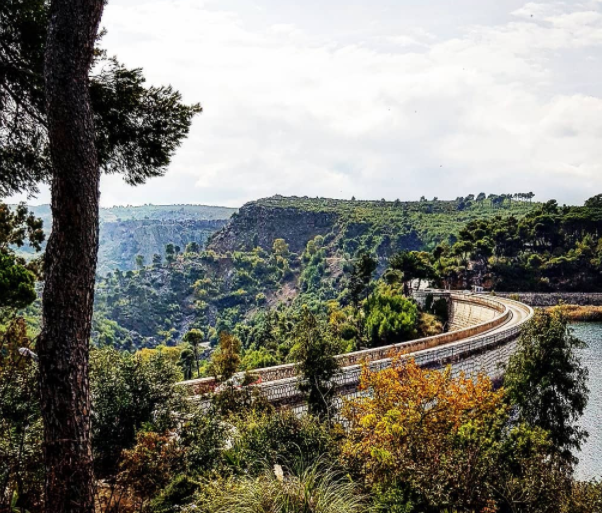
📍 Lake Marathon. @dimitrakopoulou_eleni
No matter what is said about the landscape around Marathon Lake, there's nothing like seeing it for yourself, and what better way than along a lovely bike ride. This route starts off at Stamata Square and continues in the Vredou area, then reaches the lake and continues until you reach the water dam.
Antonis Tritsis Park
Distance: From 5 to 20 km
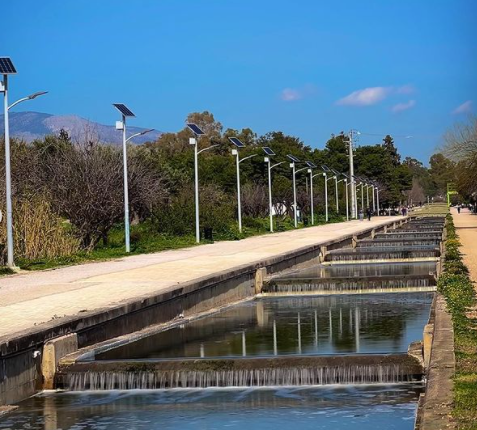
📍 Antonis Tritsis Metropolitan Park, Ilion. @qarachalios_photography
A bike ride in one of the most beautiful parks of Athens is an experience that you're sure to enjoy. Some of the routes are particularly difficult, but there are several excellent options for all types of cyclists. Of course, depending on your energy levels you can try different paths and enjoy the various landscapes that the park has to offer.
Published in
City Discovery
Tagged under
Monday, 21 March 2016 16:44
Bike Sharing Has Arrived In Athens
Now that the weather is getting warmer, what better way to explore the city's beautiful neighbourhoods and the historical center of Athens than by bike!
And if you don't own a bike, not to worry! The City of Athens has officially launched a pilot project, like so many other European capitals, for its own bike sharing service. The bicycles will be initially available at Technopolis in Gazi and the service has been available to the public since Thursday March 3rd, 2016.
AthensBikes, as the initiative is called, is a service that offers locals and visitors the opportunity to rent a bicycle in Athens for a small fee. For more information visit their website (in English) here.
Source: iefimerida
Published in
Local News
Tagged under






